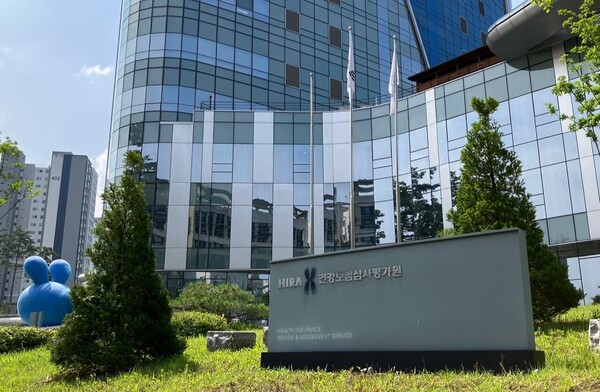
Astellas Korea's ADC (antibody-drug conjugate) drug Padcev Inj (enfortumab vedotin) has passed the Cancer Disease Review Committee (CDRC).
On Wednesday, the Health Insurance Review and Assessment Service (HIRA) released the insurance benefit standard deliberation results at this year’s first CDRC meeting.
Padcev's indication for reimbursement is "treatment of adult patients with locally advanced or metastatic urothelial carcinoma who have been previously treated with PD-1 or PD-L1 inhibitors and platinum-based chemotherapy agents. Padcev now faces the Pharmaceutical Reimbursement Review Committee (PRRC).
On the other hand, Roche Korea's Polivy Inj (polatuzumab vedotin), which had applied for reimbursing two indications, failed to pass CDRC.
Polivy's indications are "rituximab in combination with cyclophosphamide, doxorubicin, and prednisone/prednisolone (R-CHP) in adult patients with previously untreated diffuse large B-cell lymphoma (DLBCL)" and "combination therapy with bendamustine and rituximab in adult patients with relapsed or refractory diffuse large B-cell lymphoma who are not candidates for hematopoietic stem cell transplantation and have failed one or more prior therapies.
Besides, the committee decided to rediscuss MSD Korea's Keytruda Inj (pembrolizumab), which had applied to expand the reimbursement criteria. This is the third postponement following the seventh and eighth reviews last year.
There were six indications discussed in this review: early-stage triple-negative breast cancer; adjuvant therapy after surgery for renal cell carcinoma; MSI-H or dMMR metastatic endometrial cancer; MSI-H or dMMR metastatic ovarian cancer; MSI-H or dMMR metastatic small bowel cancer; and MSI-H or dMMR metastatic pancreatic cancer.
HIRA explained that it would first review the medical feasibility and necessity of each indication and discuss whether to set the reimbursement standard by submitting the financial sharing plan of the pharmaceutical company for the proven indication.
Meanwhile, Janssen Korea's Darzalex IV (daratumumab), which aimed to expand its reimbursement, succeeded in setting the reimbursement standard. The requested indication is "combination therapy with bortezomib and dexamethasone in patients with multiple myeloma who have received one or more prior therapies.
Related articles
- Concern became a reality as Keytruda’s coverage expansion stalls
- BeiGene applies for insurance benefits for esophageal cancer drug Tevimbra
- Korea's health insurance panel denies coverage for new cancer drugs
- Keytruda approved as 1st-line treatment for HER2-negative gastric cancer to vie with Opdivo
- ‘Domestic DLBCL secondary care landscape at its most vulnerable’
- Darzalex’s reimbursement has been in limbo for 3 years. Will it be different this time?

